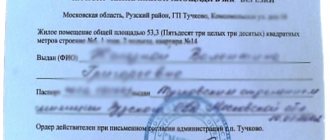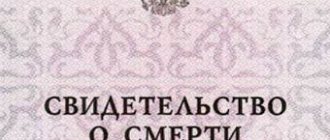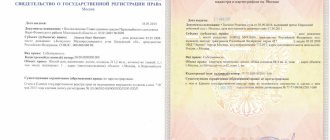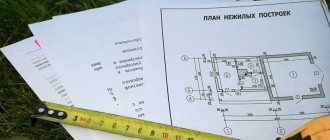In the USSR, the main document confirming the right of citizens to enter and use state-issued housing was considered to be a warrant for an apartment. What is this today, in 2021, we will find out in the review.
In 2005, a new residential complex was adopted in the Russian Federation. Since this period, the warrant for residential premises has lost the significance that it had under the Soviet Union.
It was replaced by a new type of interaction between the state and residents, more modern and comprehensive. Represents a contract.
Order definition: main characteristics
During the years of the USSR, only with the help of this document could one prove one’s right to free housing issued by the state.
It was impossible to carry out privatization or other transactions with living space without an apartment warrant. The basis was considered to be Art. 47 Residential Complex of the RSFSR.
Description of the order, how to receive it
It was issued by the District Council (executive committee) with a seal and gave the opportunity to move into housing within a month. After this period, the order was considered invalid.
What does an order look like? This is a small document containing the following information:
- address;
- description of housing (footage, etc.);
- basic information about the employer and other people moving in;
- move-in date.
The warrant was kept by the owners of the living space, and the tear-off coupon was retained by government agencies. From a legal point of view, the order does not have a limitation period for use.
Order types
To understand what rights a document gives, let’s look at its types. Indeed, in addition to the main order, there were other types of residential orders:
- Official. Granted authority to stay in official housing for a certain period of time related to work activity (for example, an official apartment for business trips of employees in the city where there is a branch of the enterprise).
- Temporary. Sometimes, due to the circumstances of work or study, housing is needed for up to 1 month (a warrant for accommodation in a hostel during a session for correspondence students).
- Lookout. Issued only for a preliminary inspection of the living space offered to the tenant.
- Exchange. Relevant when it comes to exchanging housing.
Previously, apartment orders were used more often - inspection and main. The Executive Committee first issued an inspection document consisting of one page and a tear-off coupon.
The latter remained with the executive committee, and with a warrant for five days, the tenant was obliged to visit the proposed housing, and then come to the executive committee and provide an answer consisting of refusal of the apartment or consent to move in. After this, the citizen was already issued a permanent warrant.
In Soviet times, in Article 47 of the Housing Code of the RSFSR, the document was considered the only basis for full occupancy in free public housing under a rental agreement (Article 13 of the Russian Federation).
If the warrant was not issued, then, according to the resolution of the Supreme Soviet of the USSR dated April 3, 1987 (as amended by the Plenum Resolution dated November 30, 1990), the agreement was considered invalid and did not give the right to move into an apartment, room or house .
An apartment warrant can be considered an administrative legal act in the form of an order issued by the housing department on the provision of living space to a citizen of the USSR.
The service “Moving under the renovation program” has appeared
- Copy of identity document:
- for adults – only passport (all pages);
- for minors – a birth certificate, a guardian’s passport (all pages) and a document that confirms that you are the child’s legal representative (a document confirming the transfer of a child to a foster family, issued by the guardianship and trusteeship authorities, etc.);
- for minors from 14 to 18 years old - a passport of a minor (all pages) and a passport of a legal representative (all pages);
- An extract from the house register and a copy of the financial and personal account (account card) for an apartment in your old house included in the renovation program. It must be taken to the MFC;
- Consent of the spouse to purchase an apartment or meters in a new house and his (her) refusal of the old apartment. These documents must be certified by a notary. If you are not married, then you need to provide a statement about this, also certified by a notary;
- Receipt for payment of a security deposit in the amount of 100 thousand rubles;
- Details for returning previously paid security. They must be indicated if the transaction does not take place for some reason (according to them, the 100 thousand rubles you previously paid will be returned to you):
- applicant's account number;
- name of the bank in which the applicant has an account;
- correspondent account of the bank in which the applicant has an account;
- BIC of the bank in which the applicant has an account;
- Applicant's Taxpayer Identification Number.
The public headquarters for monitoring the implementation of the renovation program is ready to share its experience on additional purchase issues accumulated recently, talk about legal requirements, and help outline an algorithm for future actions. Applications are accepted by phone on weekdays from 9 to 20 hours and by email
What to do if your order is lost
How to restore an order if it has become unusable or lost? It is required to request a copy to the archives of the housing department of a tear-off coupon proving the fact of obtaining the right to use housing. But this action will be relevant if over the past years the composition of residents in the housing has not changed.
If during this time the number of residents has changed due to death, birth or discharge (registration), then the data is already considered unreliable.
Below we list what documents are needed to restore the order:
- An application is written to the mayor's office with a request for the opportunity to conclude a social rent agreement. A housing consultant can help you draw up the document. If the administration does not satisfy the request, then the citizen has the right to file a claim with the judicial authorities.
- The citizen encloses with the application: identity cards (passports) with the registration of all residents in the apartment or house, room (if we are talking about a dormitory), an extract from the house register, bills with payment of housing and communal services.
- If necessary, the mayor's office may request additional documents.
If the city hall failed to restore the order, contacting the real estate department located in the same area as the housing will help . If the issue is not resolved there, you can still contact the 1st window service. This department usually immediately responds to the problem that has arisen and is guaranteed to work on a solution.
If a citizen is placed in a cooperative apartment
If a warrant was used by a citizen to purchase such real estate, then it must be used correctly. This document does not indicate that the citizen has no claims against the developer. It is not possible to pay the share fee using it.
And a citizen receives rights only after full payment for the property. After the house is put into operation and occupied by residents, the cooperative can re-register it as a HOA. The office provides information and stores everything in the archive. It is now very common to purchase real estate through cooperatives.
Order for an apartment - alternatives today
Currently, government agencies propose to conclude the following agreements with citizens, depending on the situation:
- Social hiring . It should be understood that an apartment warrant and a social tenancy agreement are one and the same. Has no deadlines.
- A commercial agreement is required if a transaction is being carried out to purchase or sell a home. When signing, restrictions on housing conditions are not discussed, and the cost of utilities is not reduced.
- The gratuitous transfer agreement is relevant for a certain category of the population classified as being in dire need. In this case, 18 m2 is allocated for each person, and for people with disabilities, upon presentation of documents, the number of additional meters almost always increases.
Situations when a warrant is needed
Now, for the period of 2021, the legal nature of the order is completely lost. But sometimes it is still necessary.
Some legal transactions cannot be carried out without a warrant:
- In the case when a citizen enters into a social lease agreement. And this is impossible without presenting an old housing warrant. It is a kind of basis for issuing a new document.
- If a housing privatization operation is carried out. A new agreement is sometimes not concluded and not preserved by citizens. As a result, the order remains the only document confirming the residents’ right to living space.
But it should be taken into account that in the regions of the Russian Federation the procedure for privatization of housing is slightly modified: in some regions they may ask for an old order, and a copy must be made, but in others it will be possible to privatize only if there is a new social rent agreement.
Does the warrant now have legal force?
In fact, the order and the social tenancy agreement are documents that replace each other . In the future, it is planned to completely replace the order with a more convenient form of social rent agreement. At this time, the order continues to apply.
And yes, the answer to the question: is a warrant for an apartment a document of title, can be answered in the affirmative . Although it is worth taking into account the ambiguity of the situation associated with the resolution adopted in 2005 on the social rent agreement.
This is especially true when a privatization operation takes place. According to the regulations adopted in the legislation of the Russian Federation, every citizen registered in the living space and noted in the warrant has the full right to participate in the privatization process.
There are a number of controversial issues that citizens often cannot resolve on their own. Let's take a closer look at the main ones:
- There is a warrant, but privatization was refused, why? If a citizen of the Russian Federation does not have registration, the privatization process cannot be launched. Even if there is a corresponding entry in the order about his residence in the housing. It is necessary to have a residence permit, which gives full right to participate in all transactions with living space.
- The warrant is not available (for various reasons). If the tenant is guilty, then he must restore the document according to the previously proposed scheme. When the order is lost by the authorities responsible for the operation of buildings, they must immediately offer to conclude a social rent agreement within a month. To do this, the tenant must provide an extract from the house register, an apartment card and a certificate from the personal account.
- The apartment warrant indicates a deceased person. How to proceed? When residents have a social lease agreement, they can privatize their housing. In the absence of a warrant, government agencies cannot refuse privatization, since the social rent agreement completely replaces the warrant legally.
- There is an error in the order. How to fix it and is it necessary? This means incorrectly spelled surnames of residents and a typo in address information. Such cases are not at all uncommon. But the consequences may not be the most pleasant: citizens may be denied privatization of housing if incorrect data is provided.
It is possible to file a lawsuit to have the typo corrected, but, according to the law, the order no longer applies to valid documents, which complicates the whole process. And even if the court makes a positive decision, it will not be possible to obtain a new apartment order on the basis of the law that was passed in 2005.
It is important that a social rent agreement is drawn up. And to do this, it is better not to use an order with an error. It will be enough to establish through the judicial authorities the fact of a person’s residence in the housing.
Next, a registration is issued and on the basis of it a social tenancy agreement is carried out, giving the right to privatization and the powers of the owner.
Difficulties of privatization
It must be said that not all citizens have registered ownership of their housing or entered into a social tenancy agreement. Accordingly, the property in which they live remains municipal (or state). The legislation in force today allows the privatization of an apartment by warrant. However, for many, this document is lost or has become unusable. This is what creates many problems.
Is it possible to divide the order in housing that is privatized
The order itself cannot be divided, but only the personal account is divided . Thus, rooms are assigned to each family member (or registered people in a given living space), and a recalculation of the meters allocated for all registered residents is made. It is for them that they must pay utility bills.
Usually, the question of how to divide an order in a privatized apartment is asked by relatives or family members who do not want or cannot pay utility bills together, there is no harmonious relationship, there is no mutual understanding. But it is not always easy to resolve this issue.
It is not always possible to divide an apartment into several parts. Sometimes this is simply impossible. In this case, the order itself cannot be divided, but the personal account is divided in court.
Please note: in a privatized apartment, when dividing a personal account, the apartment order has no meaning . After the court decision, each member is assigned a part of the living space, which he must pay for. First of all, mandatory payments (for electricity, heating, gas and water) are discussed.
The most appropriate solution would be to divide the housing into shares by all members entitled to this living space on a voluntary basis. Otherwise, the problem can only be resolved through the courts.
It should be noted that citizens who only have the right to live in an apartment or house do not have the right to participate in the division of a personal account. Only direct owners of housing have the right to determine and allocate a share.
Results
- An apartment warrant and a social tenancy agreement are documents that today are still interchangeable with each other. Based on the apartment order, you can directly obtain a social tenancy agreement.
- An order is a legal document containing basic information about the employer and all family members registered at the specified address. The date of move-in is also recorded in the order.
- A warrant for an apartment may be useful for the privatization process. But it is more expedient to draw up a social rent agreement in parallel.
- When dividing a privatized apartment into shares, the order does not play a major role and is not divided, but only the personal account is divided.
Commentary to Art. 82 Residential Complex of the Russian Federation
1. A social tenancy agreement can be changed at the request of the tenant in the event of the unification into one family of citizens living in the same apartment under different social tenancy agreements. In this case, citizens have the right to demand the unification of social tenancy agreements when they live in the same apartment under independent social tenancy agreements and have already united into one family. Citizens who only intend to unite into one family do not have the right to demand such unification.
Free legal advice by phone:
8 (Moscow and Moscow Region)8 (St. Petersburg and Leningrad Region)8 (Regions of the Russian Federation)
An application to the landlord for the merger of tenancy agreements is made with the consent of all family members of the tenants under social tenancy agreements, including those temporarily absent. Despite the fact that the commented article does not talk about obtaining the consent of family members, for this kind of change in the social tenancy agreement it is mandatory. In this case, a new social tenancy agreement must be concluded, and family members of the previous employers will live as one family under one agreement. They are not indifferent to whom they live in the same living quarters with, with whom they will have to run a common household and bear joint and several liability arising from the social tenancy agreement. Employers unite into one family of their own free will. The refusal of a family member of the employer to merge contracts in this case cannot be challenged in court.
Based on the equality of rights of the employer and his family members, their consent when merging social rental agreements into one independent agreement is mandatory.
The landlord does not have the right to refuse to combine social rental contracts into one independent contract if there is an application from the tenants and the consent of their family members. As a result of this merger, one social rental agreement is concluded, the subject of which is the residential premises of the previously valid agreements.
2. The legislator has excluded the possibility for a capable family member of the tenant to demand the conclusion of a separate social tenancy agreement with him in accordance with his share of the living space (division of residential premises). In this regard, this type of change in the social tenancy agreement is not provided for in this Code.
As the Constitutional Court of the Russian Federation pointed out, the mere absence in the current housing legislation of a norm on the right of a family member of the tenant to demand the conclusion of a separate rental agreement with him, as was provided for in Art. 86 of the RSFSR Housing Code does not indicate a violation of the constitutional rights of citizens.
Enshrining in Art. 40 (part 1) the right of everyone to housing and the prohibition of arbitrary deprivation of housing, the Constitution of the Russian Federation does not establish any grounds and conditions for acquiring the right to use residential premises by family members of the tenant of the residential premises - this is the prerogative of the legislator, who, within the powers granted to him, has the right to change the legal regulation of the use of residential premises under a social tenancy agreement by the specified category of citizens (Definitions of the Constitutional Court of the Russian Federation of June 20, 2006 N 225-O and of April 19, 2007 N 239-O-O).
3. A change in a social tenancy agreement is also possible at the request of a legally capable family member in the event of the retirement of the tenant or his death. If the tenant has moved to another permanent place of residence, then any capable member of his family who remains to live in this residential premises has the right, with the consent of other capable family members, to demand recognition as an employer. If agreement is not reached between members of the tenant's family, recognition by the tenant under a previously concluded social tenancy agreement occurs in court. The procedure for changing a social tenancy agreement is the same in the event of the death of the employer.
4. The commented article does not list all cases of changes to a social tenancy agreement. This Code also establishes other cases when a social tenancy agreement for residential premises is subject to change. So, for example, a change in a social tenancy agreement occurs if the tenant is provided with an isolated living space in a communal apartment (see commentary to Article 59 of the Housing Code).









